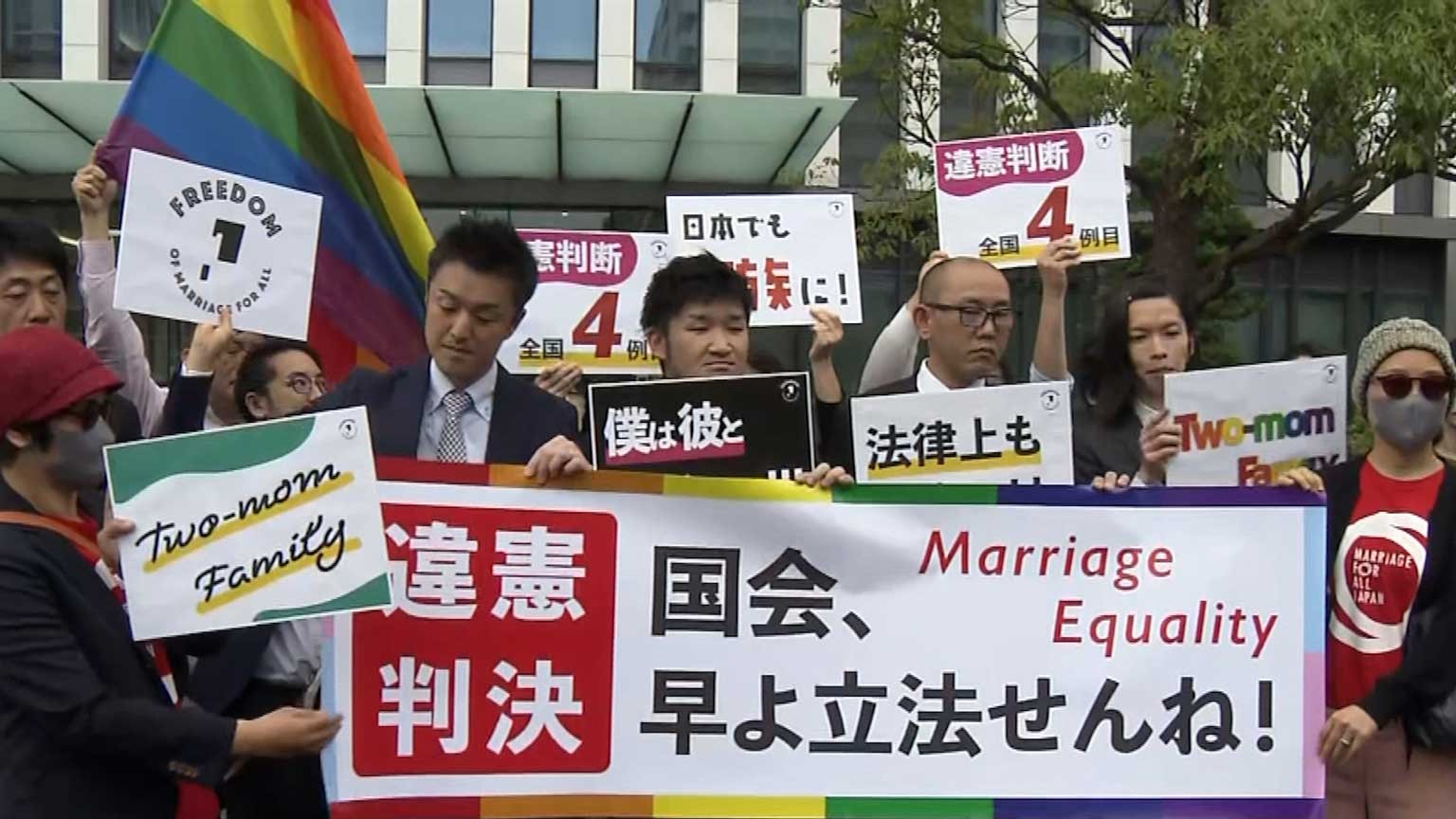The Fukuoka District Court delivered its ruling on Thursday on a lawsuit filed in 2019 by three same-sex couples living in the prefectures of Fukuoka and Kumamoto.
The plaintiffs said that being unable to marry disregards the principles of freedom and equality guaranteed by Japan's Constitution.
Presiding Judge Ueda Hiroyuki said the current marriage laws are "in a state that violates" Article 24, Section 2 of the Constitution which guarantees the dignity of individuals.
The judge said same-sex couples are not allowed to get the benefits that legal marriage provides, and such couples have no way to be legally married to the person they choose.
The court rejected the plaintiffs' demand for compensation from the government.
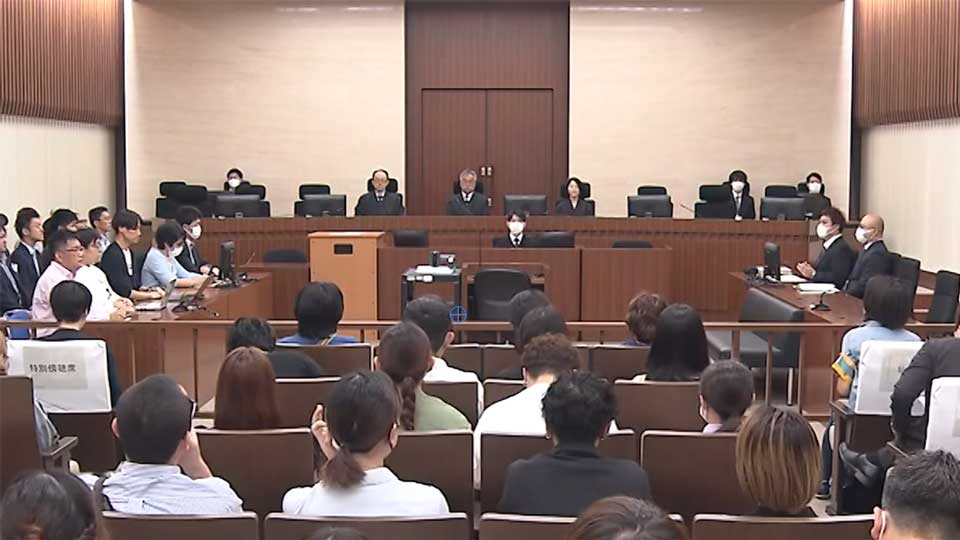
Plaintiffs call for government to take action
The plaintiffs and their lawyers held a news conference in Fukuoka after the ruling.
"I hope the ruling will make the government finally act," said Kozo, a plaintiff who chose to be identified only by that name.
"I know I cannot expect something will change right now, but we won't give up or be silenced," he said.
His partner, who identified himself as Yuta, called on the government to swiftly revise the law.
"This is the matter of human rights and people's lives," Yuta said. "I want to see a society where more people can be happy, and the day when we'll be legally recognized as a family."
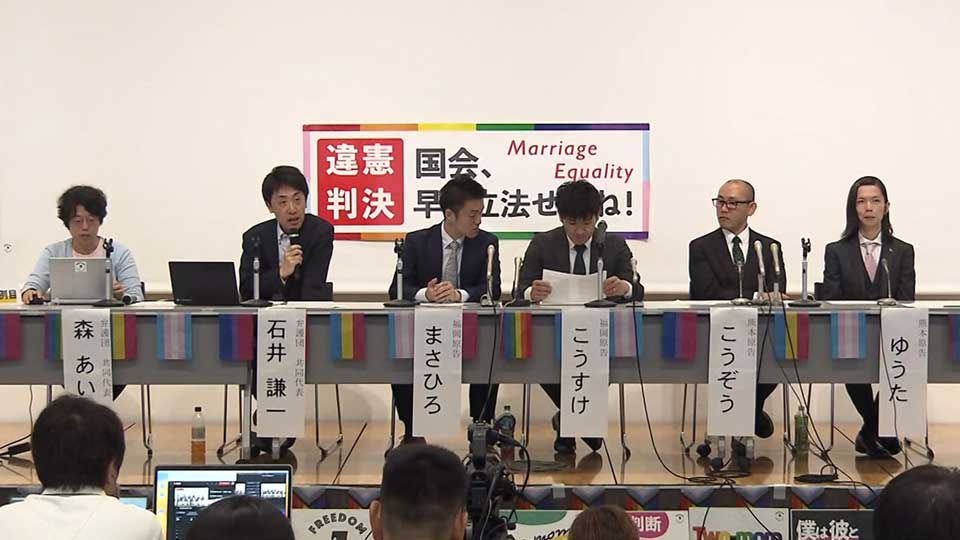
'This is about basic human rights.'
Greg Dvorak, a history professor at Waseda University, welcomed the verdict and said it sends "a very clear signal" that the current situation is "not okay."
Dvorak married his Japanese husband earlier this year in the United States, where same-sex marriage is legally recognized. The couple has lived together in Japan for about 15 years.
"I'm happy about the outcome but I'm also worried and skeptical," Dvorak said. "If this were a different country, this outcome might actually trigger change in the law."

However, Dvorak said change is possible, depending on the will of the Japanese people.
"I believe the change can happen quite quickly if people hold their leaders accountable, especially with elections thinking about whether human rights are being respected or not," he said, adding, "This is about basic human rights."
Expert: Court's message could have been 'stronger'
Tanamura Masayuki, a professor at Waseda University's Faculty of Law and an expert on issues involving sexual minorities, said the Fukuoka court's ruling acknowledged the voices of same-sex couples.
But he said the court could have sent a clearer and stronger message to the legislature, as Diet discussion of same-sex marriage has stalled.
"All five rulings so far have said not recognizing same-sex marriage is a problem, and cited the disadvantages such couples are facing. Lawmakers should take the judicial messages seriously and start discussing the issue right now," Tanamura said.
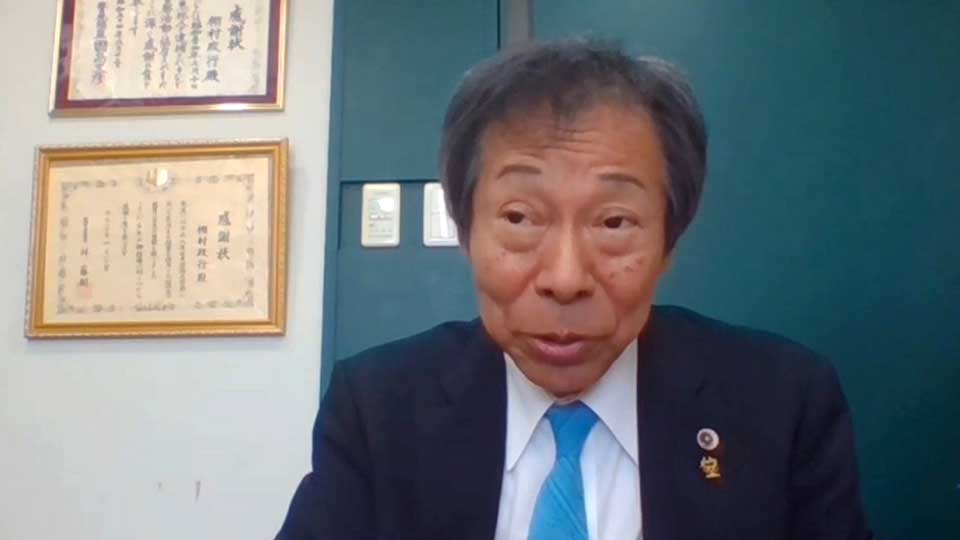
District court rulings divided
Ahead of Thursday's decision, four other district courts across Japan ruled on similar cases.
In 2019, lawsuits argued that laws which do not recognize same-sex marriage, including provisions of the Civil Code, violate Japan's Constitution.
In addition to Fukuoka, plaintiffs filed suits in district courts in Sapporo, Tokyo, Osaka and Nagoya, demanding that the government pay damages.
The first ruling was handed down by the Sapporo District Court in March 2021. The court said Japan's failure to recognize same-sex marriage violates Article 14 of the Constitution, which holds that all people are equal. It said there should be no difference in legal benefits based on sexual orientation, which cannot be selected or changed based on will. The ruling added that not allowing same-sex marriage is discriminatory and lacks reasonable grounds.
Supporters of same-sex marriage hailed the Sapporo court's decision, describing it as a landmark.
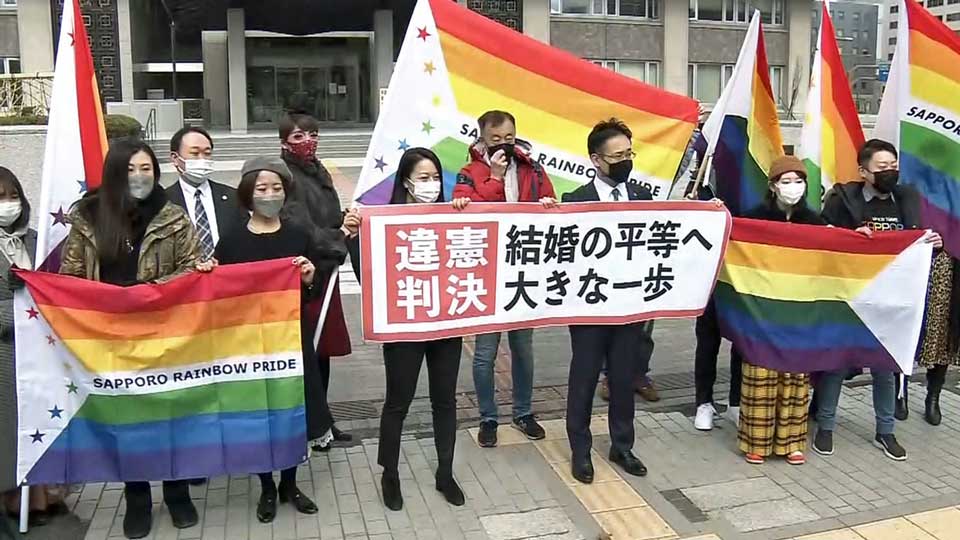
But the Osaka District Court ruled in June 2022 that Japan's lack of recognition of same-sex marriage does not violate the Constitution.
The court said that Article 24 of the Constitution stipulates that marriage shall be based on the mutual consent of parties from both sexes and does not encompass same-sex marriage. The ruling added that the gap in legal benefits has been narrowed in the existing system.
However, the Osaka court also said the Constitution should not be interpreted as prohibiting same-sex marriage, and that the issue should be decided democratically based on the country's traditions, public sentiment, and family relationships at different times.
The Tokyo District Court ruled in November 2022 that Japan's failure to recognize same-sex marriage is constitutional, but it called the current situation an "unconstitutional state" because same-sex families lack legal protections.
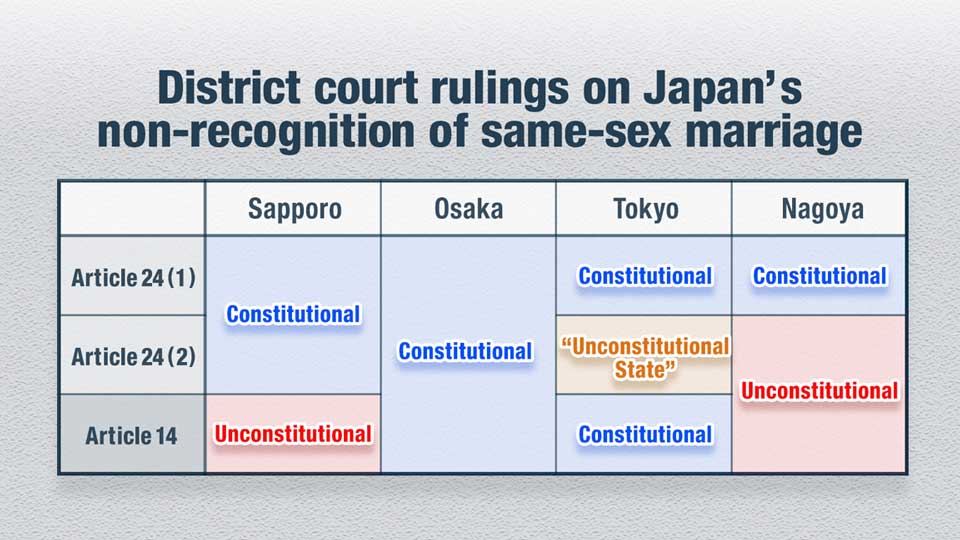
The Tokyo court noted that the Constitution guarantees the dignity of individuals and the essential equality of both sexes. Its ruling said that same-sex couples have the right to the same legal benefits as heterosexual couples.
Most recently, the Nagoya District Court ruled last month that not allowing same-sex marriage is unconstitutional.
The Nagoya court said Japan's lack of recognition of same-sex marriage violates Article 14 of the Constitution as well as Article 24, Section 2 which stipulates that "laws shall be enacted from the standpoint of individual dignity and the essential equality of the sexes."
All four courts dismissed the plaintiffs' demands for damages.
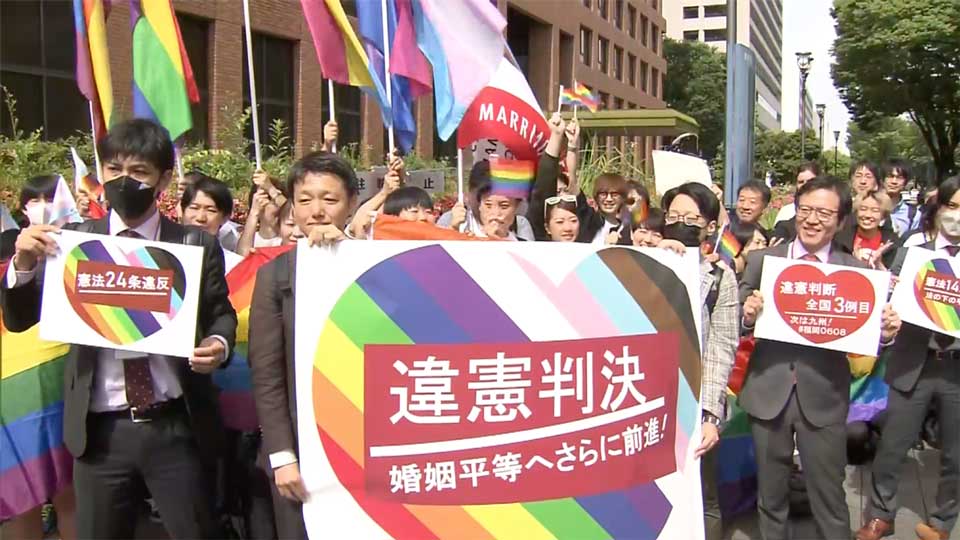
Taniguchi Hiroyuki, a professor of human rights law at Tokyo's Aoyama Gakuin University, said the four district courts were divided in terms of constitutional violation but they all more or less agreed that the current situation is not ideal.
"The judiciary has clearly stated that the ball is now in the legislature's court. Given the messages, I think the government should've already discussed the matter and revised the law," he said. "But as much as I hate to say this, the government doesn't show an intention to do this anytime soon."
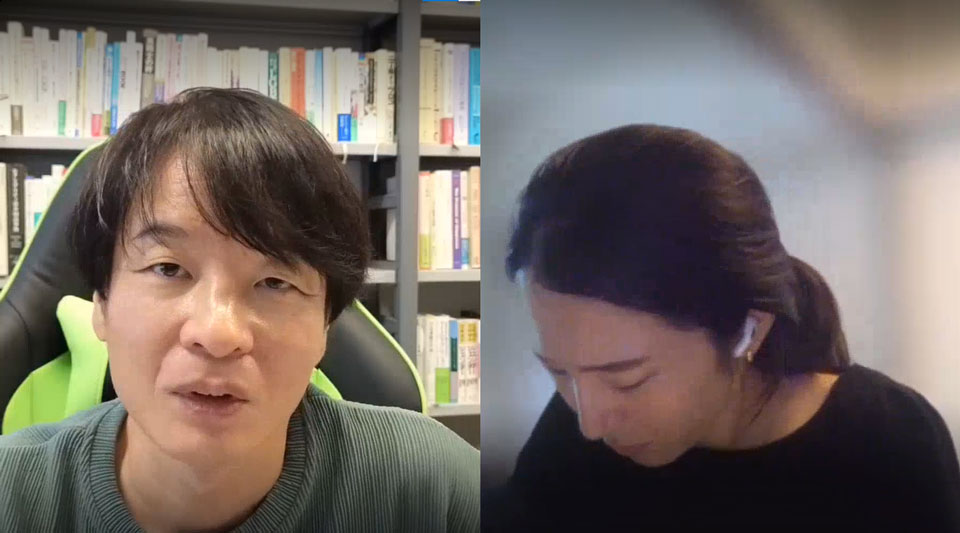
Same-sex marriage inches forward in Japan
Japan stands out as the only G7 country that does not recognize same-sex marriage.
The country has a narrow interpretation of matrimony that stems from the current Civil Code and the Family Registration Law, both of which were enacted in the 1940s.
In recent years, more than 250 local governments have introduced certificates for same-sex couples. These recognize their partnerships as equivalent to marriage in certain aspects, including the medical system, welfare, and housing.
According to a survey conducted by Tokyo's Shibuya Ward and NPO Nijiiro Diversity, as of January, more than 65 percent of Japan's population lived somewhere with a certificate system.
However, the rights specified in certificates still fall short of the legal protections and benefits of marriage. Unlike married couples, same-sex partners are not eligible for tax deductions for a spouse, or medical insurance for an employee’s dependent. They also have no parental authority over a partner’s child.
"What the partnership certificates offer is legally nonbinding. Although the system itself has a symbolic meaning, showing that the public view is changing, they fail to give the relationship a legal basis that is comparable to a marriage," Taniguchi said.
In February, Japanese Prime Minister Kishida Fumio faced criticism after he told a Lower House budget committee meeting that same-sex marriage requires "careful consideration" as it presents "a change in both family values and society."
Kishida later explained his remark, stating that he never meant to say anything negative.
Although pressure is mounting for a legislative change, Diet discussions have been stalled by some members of the ruling Liberal Democratic Party who hold traditional views of marriage.
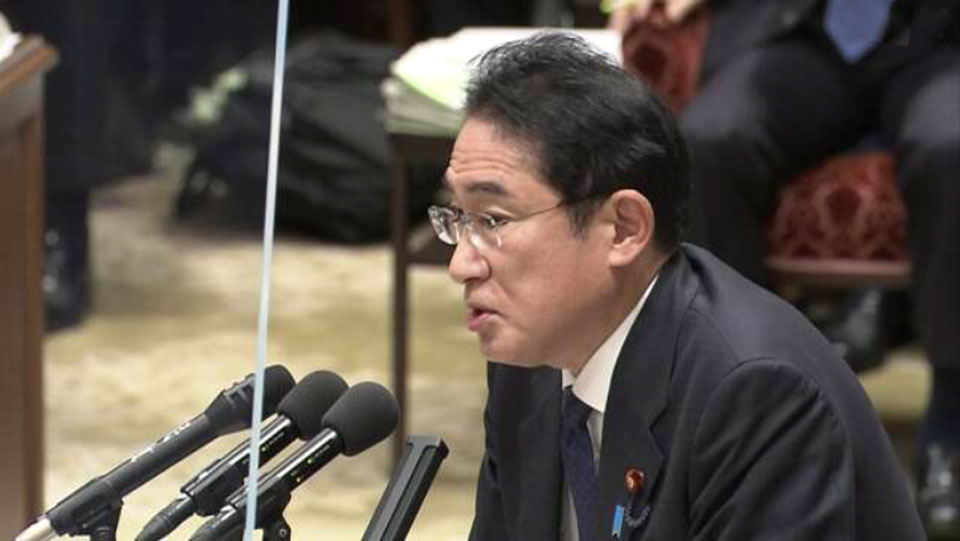
Japanese society appears to be moving faster than lawmakers. A recent NHK poll found that over 40 percent of respondents think same-sex marriage should be legalized.
According to the phone survey conducted in early April, 44 percent said same-sex marriage should be legally permitted, while 15 percent said it should not. Thirty-seven percent were undecided.
Thirty-three percent of those who think it should be legalized cited disadvantages for unmarried couples, such as lack of access to some administrative services.
Twenty-six percent said same-sex marriage is legal in other countries, and 25 percent said they think not recognizing it violates Japan's Constitution.
